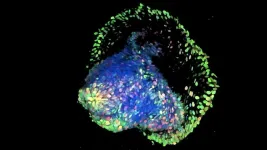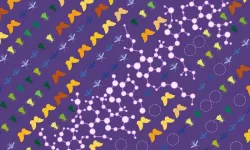(Press-News.org) Dr. Kevin J. Kelly, an assistant professor in the Department of Physics and Astronomy at Texas A&M University and a member of the George P. and Cynthia Woods Mitchell Institute for Fundamental Physics and Astronomy, has been selected as the 2025 recipient of the American Physical Society’s Henry Primakoff Award for Early-Career Particle Physics in recognition of his contributions and promising career potential in fundamental particle physics and cosmology.
Kelly, who joined the Texas A&M faculty in 2022, works at the interface of two of the biggest outstanding mysteries in particle physics: the origin of neutrino masses and the nature of dark matter in the universe. His research spans the smallest scales to the largest, focusing on current and next-generation experiments with the potential to shed light on both through new physics in the neutrino sector and the ongoing search for light dark matter and any associated new particles that may exist in that realm.
“By studying the capabilities of these experiments, not only can we determine how they can extract all possible information out of their data, but we can also explore whether there are connections between the two mysteries of neutrino mass and dark matter,” Kelly said.
Established in 2011 by the APS Division of Particles and Fields, the Primakoff Award is bestowed annually to physicists who have received a Ph.D. within the last seven years in recognition of accomplishments in both experimental and theoretical particle physics. It is supported by the Henry Primakoff Lecture Fund, created by members of the physics department at the University of Pennsylvania, where Henry Primakoff was a professor.
Kelly is cited “for significant contributions to our understanding of the neutrino sector and proposing novel directions and search strategies, bolstering the physics output of current and future neutrino experiments.” He will be presented with his award, which includes $3,000 and a certificate, at a future APS meeting, where he will deliver an invited lecture on his research.
“We are very happy to congratulate Dr. Kelly on this achievement, said Dr. Grigory Rogachev, professor and head of Texas A&M Physics and Astronomy. "Receiving a prestigious award from the APS so early in his career is an amazing launching pad. Dr. Kelly is an outstanding recent addition to the already strong effort in theoretical particle physics at Texas A&M University.”
Kelly earned his Ph.D. in physics at Northwestern University in 2018 and spent three years as a postdoctoral research associate in the theory group at Fermi National Accelerator Laboratory (2018-2021), then a year as a senior fellow in the Department of Theoretical Physics at CERN (2021-2022) prior to coming to Texas A&M. In addition to authoring nearly 50 publications, he serves as a journal referee for Physical Review Letters, Physical Review D and the Journal of High Energy Physics. An in-demand speaker in both national and international circles, Kelly has helped organize multiple conferences and workshops, including EuCAPT Symposium 2022 and PONDD 2018. He is also active in physics outreach, organizing Neutrino University 2019 and participating in the Saturday Morning Physics programs at both Fermilab and Texas A&M along with the annual Texas A&M Physics and Engineering Festival.
The nonprofit American Physical Society, which works to advance physics by fostering a vibrant, inclusive and global community dedicated to science and society, represents more than 50,000 members, including physicists in academia, national laboratories and industry in the United States and around the world.
Learn more about APS honors and recognition programs or about Kelly and his teaching, research and service activities at Texas A&M.
###
By Shana K. Hutchins, Texas A&M University College of Arts and Sciences
END
Texas A&M physicist Kevin Kelly earns American Physical Society Early Career Award
2024-10-24
ELSE PRESS RELEASES FROM THIS DATE:
University of Maryland researcher awarded $1.8 million to study climate change’s impact on people with kidney disease
2024-10-24
Climate change is driving more extreme heat and more air pollution from wildfires, each of which put human health at risk. Now, new research funded by the federal Agency for Healthcare Research and Quality (AHRQ) and led by University of Maryland School of Public Health Professor Dr. Amir Sapkota, will study how these hazards independently and jointly impact already vulnerable groups, such as people living with end stage kidney disease (ESKD). The researchers aim to identify preventative solutions.
“During extreme heat, the damaged kidneys of people with ESKD do not regulate fluid levels very ...
Johns Hopkins Children’s Center research in mice suggests zinc supplements have potential value to directly treat short bowel syndrome
2024-10-24
Researchers from Johns Hopkins Children’s Center say they have identified a gene pathway involving the mineral zinc in mice that may someday point the way to using zinc-based supplements to directly help people with a rare disorder called short bowel syndrome (SBS).
The findings, published Oct. 7 in Nature Communications, help advance efforts toward more effective, potential treatment regimens for both children and adults with the debilitating condition.
SBS, which affects 10,000–20,000 adults and children in the United States, is marked by damage to and shortening of ...
Kalinin receives David Adler Lectureship Award
2024-10-24
Sergei Kalinin, a professor in the Department of Materials Science and Engineering, has been named the winner of the David Adler Lectureship Award in the Field of Materials Physics by the American Physical Society. The award recognizes one outstanding contributor in the field of materials physics who is notable for high-quality research, review articles, and lecturing.
“I am deeply honored to receive the Adler Award, as it recognizes the critical transition in materials discovery that my colleagues at the University of Tennessee and Pacific Northwest National Laboratory and I have championed,” ...
Evaluating the link between chemicals and declining insect populations
2024-10-24
Few people are fans of stink bugs, mosquitoes, or boll weevils, but insects play a key role in the circle of life that makes up the planet’s environment. In fact, world-renowned biologist E. O. Wilson famously declared that if insects vanished, our environment would collapse.
Scientists have noted that insect behaviour has been changing, and their populations are declining – on average 2-3% per year. This has prompted them to investigate the potential causes of this change, such as habitat loss due to overdevelopment, climate change, and chemical use.
EMBL researchers and collaborators recently investigated how pesticides, herbicides, ...
Scientists discover molecules that store much of the carbon in space
2024-10-24
A team led by researchers at MIT has discovered that a distant interstellar cloud contains an abundance of pyrene, a type of large, carbon-containing molecule known as a polycyclic aromatic hydrocarbon (PAH).
The discovery of pyrene in this far-off cloud, which is similar to the collection of dust and gas that eventually became our own solar system, suggests that pyrene may have been the source of much of the carbon in our solar system. That hypothesis is also supported by a recent finding that samples returned from the near-Earth asteroid Ryugu contain large quantities of pyrene.
“One of the big questions in ...
Sublethal agrochemical exposure disrupts insect behavior and long-term survivability
2024-10-24
Even at concentrations too low to kill, exposure to widely used agrochemicals – pesticides, herbicides, and fungicides, among others – has pervasive negative impacts on insect behavior and physiology, researchers report. The findings highlight the need for more comprehensive pesticide assessments, focusing not just on lethality but also on unintended long-term ecological harm to safeguard biodiversity. Over the past decade, many reports have highlighted alarming declines in insect ...
Understanding that US wildfires are becoming faster-moving is key to preparedness
2024-10-24
“The modern era of megafires is often defined based on wildfire size,” say Jennifer Balch and colleagues in a new study, “but it should be defined based on how fast fires grow and their consequent societal impacts.” Balch and colleagues report that wildfire growth rates in the U.S. have surged over 250% over the last 2 decades. Although these fast-moving infernos, or “fast fires” – those spreading more than 1,620 hectares in a day – account for only 2.7% of wildfire events from 2001 to 2020, researchers report that they are responsible for 89% of the total structures damaged ...
Model predicts PFAS occurrence in groundwater in the US
2024-10-24
According to a new machine learning-assisted predictive model, as many as 95 million Americans may rely on groundwater containing PFAS for their drinking water supplies before any treatment, researchers report. This raises concerns about unmonitored contamination in domestic and public water supplies. Per- and polyfluoroalkyl substances (PFAS), often called “forever chemicals,“ are highly persistent environmental contaminants linked to adverse environmental and health effects. Used in many consumer products, these organic pollutants have become ubiquitous in the environment and ...
By studying new species of tardigrade, researchers glean insights into radiation tolerance
2024-10-24
Tardigrades, eight-legged microorganisms colloquially known as “water bears,” are the most radiation-tolerant animals on Earth. Now, by studying a newly identified species of tardigrade, researchers have gleaned valuable insights into the animal’s ability to withstand radiation. These findings hold implications for safeguarding human health in extreme environments, such as spaceflight. Roughly 1,500 species of tardigrades have been described. These creatures can endure gamma radiation ...
Plastic chemical causes causes DNA breakage and chromosome defects in sex cells
2024-10-24
A new study conducted in roundworms finds that a common plastic ingredient causes breaks in DNA strands, resulting in egg cells with the wrong number of chromosomes. Monica Colaiácovo of Harvard Medical School led the study, which was published October 24 in the journal PLOS Genetics.
Benzyl butyl phthalate (BBP) is a chemical that makes plastic more flexible and durable, and is found in many consumer products, including food packaging, personal care products and children’s toys. Previous studies have shown that BBP interferes with ...




